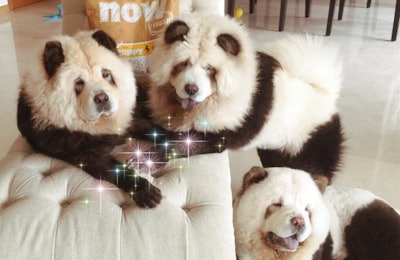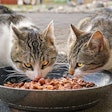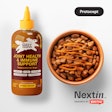
From Petfood Industry:
Recently, Petcurean announced that the pet food company will sponsor three Chow Chows dyed to look like panda bears. The dogs live in Singapore where their owner Meng Jiang runs a business featuring the dogs in photoshoots at birthday parties, weddings and other events. The dogs’ names are TuDou (Potato), YüMi (Sweetcorn) and DouDou (Bean).
Dyeing white dogs to look like pandas has become a trend in the rapidly growing pet care market in East Asia, reported the Daily Mail. One groomer in Chengdu, China said he can groom a dog into a panda in two hours, and the look will last for six weeks.
However, not everyone is enamored of the panda pups. After a story featuring the Singaporean panda Chow Chows ran in the Daily Mail, Jiang faced criticism from people concerned about the animals’ welfare. One concern protesters raised is that dying the fur around the eyes and ears could be particularly risky. However, Jiang claims the dyes are organic, non-toxic and safe. An online petition on change.org calls for Jiang to end the dying of her dogs.
Although scientists have documented low to moderate toxic effects in humans from hair dyes, little peer-reviewed research exists on the effects of hair dye on dogs.
They're black and white and huge in China - but they're dogs: Panda 'lookalikes' are hit with the new middle class as pet owner says 'ten years ago we'd have eaten them'
The middle class in China are snapping up dogs that resemble pandas Pet shop owners use grooming and colouring to give them new look Animal will look the same for six weeks before it needs another trim It is panda-monium in pet shops in China as dogs that look like the country's unique and rare bears become all the rage.
Owner of dyed 'panda dogs' hits back at critics saying she is cruel
Owner Meng Jiang from Singapore argues that dye is natural and not damaging to the health of her animals Pampered pooches dine like royalty on fresh beef, fish and soy milk, and have many health and beauty treatments Meng and husband set up new photo shoot business venture in which customers can be snapped with the dogs A Singaporean woman who made headlines last week by dying her dogs to look like pandas has hit back at her critics who have accused her of being cruel to the animals, saying there is nothing inappropriate about her treatment of them.


















